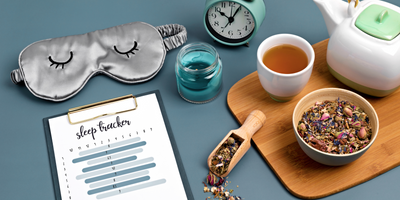
Catching Z's and Avoiding Colds: The Link Between Sleep and Immunity
Ever wondered why after a restless night, you sometimes feel a bit under the weather? Or why when you're sick, all you want to do is snuggle under the covers? It's all about the incredible bond between sleep and our immune system. Dive deep into this fascinating connection and learn how to harness the power of sleep to stay healthy.
Your Sleep: The Unsung Hero of Health
Sleep isn't merely an escape from the daily hustle or a break for the weary. It operates like a silent, diligent caretaker, ensuring our body remains primed to fight off bugs and germs. The remarkable part is that not everyone realises the essential role sleep plays in our overall well-being. We've all been taught the importance of eating right and staying active, but quality sleep ranks right up there with these other health pillars.
Balancing sleep is crucial. Both insufficient and excessive sleep can create health disturbances. Striking the perfect balance is essential to optimise our health. This 'sweet spot' isn’t only about duration but also the quality of our slumber. When we frequently binge-watch shows late into the night or habitually ignore our alarm clocks, we're unconsciously making health decisions. Knowledge is power, and understanding the trade-offs of poor sleep choices can steer us towards healthier habits.
The Sleep and Immunity Dance
When we're comfortably nestled in our beds and journeying through the realms of dreamland, our body remains active. During these hours, it produces proteins known as cytokines. These aren’t just any proteins; they’re vital in combating infections, inflammation, and stress. They’re our frontline warriors when harmful microbes try to invade.
However, when our sleep suffers, so does the production of these vital cytokines. Just imagine having fewer soldiers on the battlefield during an invasion. Similarly, reduced cytokine production means our defenses against potential infections weaken. Cytokines play diverse roles, and ensuring a proper balance of these proteins is another hidden job sleep undertakes for us.
The Price of Sleepless Nights

We've all had those nights where sleep seems elusive. Tossing and turning, watching the minutes turn into hours. While an isolated restless night might not be cause for concern, consistently poor sleep can, over time, suppress our immune function. A weakened immune system increases our susceptibility to infections and illnesses.
The cumulative effect of regular sleep deprivation can be dire, increasing our risk of chronic diseases and reducing our body's efficiency in healing and repairing. It isn’t just about the immediate effects, like feeling groggy or irritable. Over time, chronic sleep deprivation can have lasting impacts on our overall health.
Deep Sleep and Health Memory
REM or Rapid Eye Movement sleep, often associated with vivid dreams, serves a more profound, vital function. During this phase, our body records information about pathogens, ensuring our immune system remembers and recognises them in future encounters.
Every skirmish our body has with bugs, viruses, or bacteria is a learning experience. Deep sleep plays the role of a meticulous librarian, logging in these experiences to ensure we're well-prepared for future confrontations. It underscores the importance of not just the quantity but the quality of our sleep. While we may clock in a good number of hours, ensuring we get sufficient deep sleep is crucial for optimal health.
Stress, Sleep, and Staying Strong
Stress and sleep share a complex relationship, often acting as two sides of a problematic coin. Life's myriad stresses, be it work pressures, personal issues, or even global events, can severely disrupt our sleep. Conversely, a lack of sleep can exacerbate feelings of stress, anxiety, and overwhelm.
When trapped in this cycle, our immune function starts to decline, making us more susceptible to illnesses. Escaping this cycle is paramount for both mental and physical health. Strategies such as relaxation exercises, deep breathing, engaging in hobbies, or merely talking with loved ones can be instrumental in restoring balance.
Practical Tips for Better Sleep
Crafting the ideal sleep environment can be a game-changer. Ensure your bedroom feels like a sanctuary. It should be quiet, dark, and cool. Investing in comfortable bedding can also make a significant difference. But the surroundings are just one aspect. Cultivate a bedtime routine – perhaps it involves reading a book, listening to calming tunes, or practicing gentle stretches. These activities can prepare your body and signal that it's time for rest. And if you find that, despite your best efforts, sleep remains elusive, consider seeking advice from sleep experts. Some issues, like sleep apnea, need professional intervention.
Nutrition’s Role in Quality Sleep
Ever heard of the phrase, "You are what you eat?" Well, it rings true for sleep too. The connection between what's on our plate and how well we sleep is stronger than most realise. Certain nutrients act as sleep boosters, enhancing the quality and duration of our sleep. For instance, magnesium-rich foods like almonds or bananas can potentially aid in better sleep. Then there's the sleepy effect of turkey, often attributed to the amino acid tryptophan, which can help produce sleep-regulating serotonin and melatonin.
However, it's not just about adding these foods to our diet. Avoiding caffeine, nicotine, and large meals before bedtime can significantly impact sleep quality. So, the next time you’re contemplating that late-night snack, remember that what feels good in the moment might disturb your slumber later.
The Sleep-Recovery Cycle
Illness and sleep have an intimate relationship. When under the weather, our body craves rest. This is because sleep accelerates the recovery process. The reverse is also true; optimal sleep can help prevent illnesses. This relationship is especially pertinent when it comes to viral infections.
While all stages of sleep bolster our immune system, deep sleep is particularly vital. It aids in the release of growth hormones — crucial for cell repair. So, during flu season or when there's a viral outbreak, ensuring we're well-rested can be our best defense. As they say, prevention is better than cure, and consistent quality sleep can often be the first line of defense.
Establishing a Routine
Humans are creatures of habit. Our bodies thrive on routine, especially when it comes to sleep. Going to bed and waking up at the same time every day, even on weekends, can significantly enhance sleep quality. Over time, this consistency sets our internal body clock, making waking up feel more natural and less groggy.
Besides the timing, rituals can enhance our bedtime routine. This could be something as simple as reading a few pages of a book, practicing mindfulness meditation, or indulging in some aromatherapy with calming scents like lavender. The key is repetition. Over time, these activities signal the brain that it's time to wind down, preparing the body for restful sleep.
Summary
Your Sleep: The Unsung Hero of Health- Sleep is more than just a break from daily activities; it's a critical component of health, playing a vital role in bolstering our immune system. This often-overlooked aspect of health is as important as diet and exercise.
- Achieving the right balance of sleep is essential for optimal health. Both too little and too much sleep can negatively impact our well-being. Understanding the importance of sleep quality and duration is key to making healthier lifestyle choices.
- During sleep, our bodies produce cytokines, proteins essential for fighting infections, inflammation, and stress. This process highlights the active role of sleep in maintaining our immune system.
- Lack of sleep leads to decreased production of these crucial cytokines, weakening our body's defense against infections. This underscores the importance of consistent, quality sleep for robust immune function.
- Chronic sleep deprivation can lead to a suppressed immune system, increasing vulnerability to infections and illnesses. Occasional sleepless nights might not be harmful, but consistent poor sleep can have significant long-term health consequences.
- Regular lack of sleep can increase the risk of chronic diseases and impair the body's ability to heal and repair itself, demonstrating the far-reaching effects of sleep on overall health.
- REM sleep is critical for the immune system's 'memory'. It helps the body remember and recognise pathogens in future encounters, playing a crucial role in long-term immunity.
- Quality deep sleep is essential for recording these encounters, highlighting the importance of not just the quantity but the quality of sleep for maintaining a strong immune system.
- Stress and sleep have a bidirectional relationship, where stress can disrupt sleep, and lack of sleep can increase stress. This cycle can weaken the immune system.
- Breaking this cycle is important for both mental and physical health. Techniques like relaxation exercises and engaging in hobbies can help restore sleep and reduce stress.
- Creating a conducive sleep environment and establishing a bedtime routine can significantly improve sleep quality. This includes having a quiet, dark, and cool bedroom and engaging in relaxing activities before bed.
- For persistent sleep issues, seeking professional advice is recommended, as some sleep disorders require specialised treatment.
- Diet plays a significant role in sleep quality. Foods rich in certain nutrients can enhance sleep, while avoiding stimulants like caffeine before bedtime is crucial.
- Incorporating sleep-promoting foods and being mindful of eating habits can improve both the quality and duration of sleep.
- Sleep is vital for recovery from illness and can also help prevent sickness. This is particularly true for viral infections, where deep sleep plays a key role in the body's defense mechanism.
- Ensuring adequate and quality sleep during illness and health is crucial for the body's recovery and defense processes.
- Consistency in sleep routines helps set the body's internal clock, improving sleep quality and making waking up easier. This includes regular sleep and wake times.
- Bedtime rituals, such as reading or meditation, can signal the brain to prepare for sleep, aiding in the transition to restful sleep.
Deep Sleep Support
We’ve created a Deep Sleep Supporting supplement with a combination of the best available ingredients proven to assist in a better night’s sleep. This supplement is an easy-to-mix, great-tasting powder, offering a therapeutic dose of the nutrients your body needs to relax and fall asleep. Learn more about it here.









